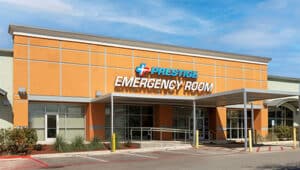Pediatric Allergy Treatment in San Antonio
When your child experiences a severe allergic reaction, every second counts.
At Prestige ER, our compassionate and experienced team is ready to provide rapid, expert children’s allergy treatment 24 hours a day, seven days a week, giving you peace of mind during life’s most worrisome moments.
What Is a Pediatric Allergy?
A pediatric allergy is any allergic reaction experienced by a child where their immune system overreacts to a normally harmless substance. The body mistakenly identifies the allergen as a threat and attacks it, leading to several uncomfortable symptoms.
Common allergens include:
- Pollen.
- Insect bites or stings.
- Dust.
- Mold.
- Animal dander.
- Latex.
- Certain medications.
Common Allergies in Children
- Food allergies
Common food allergies include milk, eggs, peanuts, tree nuts, fish, shellfish, wheat, and soy. - Eye allergies
Common allergens like pollen, dust, or animal dander can irritate the eyes, causing redness, swelling, and tearing. - Skin allergies
A rash can occur when the skin comes into contact with an allergen (e.g., plants, metals, chemicals, or airborne allergens).
Symptoms of Allergic Reactions in Children
Common pediatric allergy symptoms include one or more of the following:
- Skin: Itching, hives, redness, swelling, and, in severe cases, blistering.
- Mouth: Itching, swelling of the lips, gums, or tongue.
- Throat: Itching, tightness, difficulty breathing, closure, or hoarseness.
- Gut: Nausea, vomiting, cramps, diarrhea.
- Lung: Shortness of breath, coughing, wheezing.
- Heart: Weakened pulse, dizziness, or fainting.
- Eyes: Itching, redness, swelling, and tearing.
- Nose: Sneezing and a runny or congested nose.
- Ears: Itching, popping, or a sense of fullness.
While most allergic reactions are mild, go directly to the nearest emergency room if your child has a severe allergic response such as anaphylaxis.
What Causes an Allergic Reaction?
An allergic reaction occurs when the immune system mistakes a harmless substance for a dangerous one and produces antibodies to fight the allergen. The antibodies then trigger the release of histamines into the bloodstream, causing allergy symptoms.
Diagnostic Tests for Allergy in Children
Your child’s doctor, pediatrician, or Prestige Emergency Room doctor may recommend one or more of the following pediatric allergy testing services, including:
- Skin prick or patch tests.
A diluted allergen is applied to the skin with a small scratch. A positive allergen reaction appears as a red, itchy bump. - Intradermal tests.
A diluted allergen is injected into the skin with a thin needle and is often used if a skin prick or patch test does not reveal a penicillin or venom allergy. - Blood tests.
Blood tests measure the levels of certain antibodies to specific allergens and are often used when skin tests cannot be performed. - Food challenge tests.
The oral food challenge (OFC), considered the gold standard for confirming a food allergy, involves giving a child small amounts of a suspected food in increasing amounts over time. - Lung function tests.
If your child has asthma, this test can help evaluate lung function and determine how well-controlled it is.
Pediatric Allergy Treatment Options
The most important thing to do if your child has an allergic reaction is to identify the specific allergen and limit their exposure to it. Additional children’s allergy treatment options include:
- Medications
Medications include antihistamines to alleviate sneezing, itchy eyes, and runny noses, nasal steroids to reduce nasal inflammation and congestion, and eye drops to relieve itchy eyes. - Immunotherapy
Immunotherapy can treat severe allergies that do not respond well to medications. These may include things like allergy shots to gradually expose the body to small amounts of the allergen to help your child build up a tolerance over time. - Epinephrine
Epinephrine is the only pediatric allergic reaction treatment that effectively reverses the life-threatening symptoms of anaphylaxis and should be used immediately if an allergic reaction is suspected. Always seek emergency room services after administering epinephrine to ensure proper monitoring and receive further treatment.
When To Go to the ER for Pediatric Allergies
Go to your nearest emergency room for immediate medical attention for severe children’s allergy symptoms such as, swelling of the face or throat, difficulty breathing, rapid heartbeat, dizziness, or loss of consciousness.
What to Expect in the Pediatric ER
Initial Assessment, Rapid Symptom Management, and Emergency Treatments
If your child is having a severe allergic reaction, our highly trained team at Prestige ER will quickly evaluate and stabilize them for allergic reactions. Our providers will ensure they receive appropriate medications, including epinephrine (adrenaline). Other medications may include oxygen, inhaled medications like albuterol, and intravenous antihistamines and steroids.
Monitoring and Stabilization Procedures
Your provider will discuss your child’s medical history, including any previous allergies or reactions. They may also order blood work and other children’s allergy tests to diagnose and treat their allergic reaction and rule out other conditions.
Our medical team will continuously monitor your child’s vital signs and progress, including their heart rate, blood pressure, and breathing, and treat rebound reactions or complications.
Why Choose Prestige ER for Pediatric Allergy Treatment
Our caring and experienced emergency room staff will strive to keep you informed and your child comfortable while providing prompt, excellent pediatric allergy treatment. We will ensure your child goes home safely with the medications, resources, and knowledge you need to manage pediatric allergies.
Our pediatric emergency rooms are open 24 hours a day, seven days a week ,to provide the life-saving care you need when you need it.
- Skin prick or patch tests.
A diluted allergen is applied to the skin with a small scratch. A positive allergic reaction appears as a red, itchy bump. - Intradermal tests.
A diluted allergen is injected into the skin with a thin needle and is often used if a skin prick or patch test does not reveal a penicillin or venom allergy. - Blood tests.
Blood tests measure the levels of certain antibodies to specific allergens and are often used when skin tests cannot be performed. - Food challenge tests.
The oral food challenge (OFC), considered the gold standard for confirming a food allergy, involves giving a child small amounts of a suspected food in increasing amounts over time. - Lung function tests.
If your child has asthma, this test can help evaluate lung function and determine how well-controlled it is. - Medications
Medications include antihistamines to alleviate sneezing, itchy eyes, and runny noses, nasal steroids to reduce nasal inflammation and congestion, and eye drops to relieve itchy eyes. - Immunotherapy
Immunotherapy can treat severe allergies that do not respond well to medications. These may include things like allergy shots to gradually expose the body to small amounts of the allergen to help your child build up a tolerance over time. - Epinephrine
Epinephrine is the only pediatric allergic reaction treatment that effectively reverses the life-threatening symptoms of anaphylaxis and should be used immediately if an allergic reaction is suspected. Always seek emergency room services after administering epinephrine to ensure proper monitoring and receive further treatment.
Pediatric Allergy Treatment Options
The most important thing to do if your child has an allergic reaction is to identify the specific allergen and limit their exposure to it. Additional children’s allergy treatment options include:
When To Go to the ER for Pediatric Allergies
Go to your nearest emergency room for immediate medical attention for severe children’s allergy symptoms such as, swelling of the face or throat, difficulty breathing, rapid heartbeat, dizziness, or loss of consciousness.
What to Expect in the Pediatric ER
Initial Assessment, Rapid Symptom Management, and Emergency Treatments
If your child is having a severe allergic reaction, our highly trained team at Prestige ER will quickly evaluate and stabilize them for allergic reactions. Our providers will ensure they receive appropriate medications, including epinephrine (adrenaline). Other medications may include oxygen, inhaled medications like albuterol, and intravenous antihistamines and steroids.
Monitoring and Stabilization Procedures
Your provider will discuss your child’s medical history, including any previous allergies or reactions. They may also order blood work and other children’s allergy tests to diagnose and treat their allergic reaction and rule out other conditions.
Our medical team will continuously monitor your child’s vital signs and progress, including their heart rate, blood pressure, and breathing, and treat rebound reactions or complications.
Why Choose Prestige ER for Pediatric Allergy Treatment
Our caring and experienced emergency room staff will strive to keep you informed and your child comfortable while providing prompt, excellent pediatric allergy treatment. We will ensure your child goes home safely with the medications, resources, and knowledge you need to manage pediatric allergies.
Our pediatric emergency rooms are open 24 hours a day, seven days a week ,to provide the life-saving care you need when you need it.












